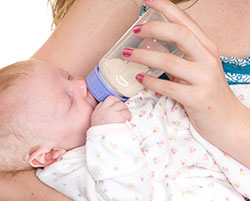
What Causes Colic
Colic Tips From Dr. Sears Excerpt with permission from “The Portable Pediatrician” by Dr. Bill Sears, MD.
The five usual medical causes of the "hurting baby" are:
1. Gastroesophageal reflux disease (GERD). In our experience, this is the most common cause of "colic." The regurgitated stomach acid causes "heartburn." Clues from GERD are:
- Baby frequently spits up soon after feeding, or some reflux comes halfway up.
- Baby is in more pain when lying flat.
- Baby seems more comfortable when being held in the upright position.
- Baby is restless and suffers frequent, painful night waking.
- Baby shrieks in pain after a feeding.
2. Overactive let-down of breast milk. Some breasts respond "too well" to Baby and release a rush of milk during the first few minutes of a feed. Baby gulps his way through, swallows too much air, and gets gas pains. This "fore" milk is also higher in lactose sugar than the high-fat "hind" milk, which also creates more gas during digestion. Talk to a lactation consultant, or call La Leche League (1-800-LA-LECHE) for tips on how to slow your let-down and increase hind milk.
3. Food sensitivities to a breastfeeding mother’s diet. Sensitivities to foods in a breastfeeding mother’s diet is next on the list of hidden causes of "colic." Although there may be others, in our experience the following are the most common fuss foods that breastfeeding mothers report:
- dairy products
- egg whites
- cruciferous vegetables (cabbage, broccoli, onions)
- spices and foods with strong flavor (such as garlic)
- caffeine-containing foods (soft drinks, coffee, chocolate, cold remedies)
- soy products
Here are some clues that your baby may be sensitive to a food in Mother’s diet:
- Baby keeps pulling off the breast during feeding and crying as if in pain. Feeding time can be difficult for the allergic baby and frustrating for the breastfeeding mother.
- Baby seems gassy or bloated after a feeding.
- Baby’s painful episodes occur within a few minutes after feeding.
- Baby’s bowel movements are watery, mucousy, and sometimes "explosive."
- The "target sign," a circular, red rash, is visible around Baby’s anus. (Food sensitivities cause the stools to be more acidic, thus causing a burn-like rash.)
- Baby’s behavior significantly improves during Mother’s elimination diet.
Starting an Elimination Diet
- List the fuss foods that are most suspect, particularly those !II other enjoys or tends to "overdose" on. Food sensitivities are often dose-related, meaning Baby is not bothered if Mother drinks one glass of milk but gets fussy if Mother downs three glasses. Mother should eliminate the most suspicious fuss foods from her diet for at least two weeks, and, if Baby improves, Mother can add them back into her diet one by one.
- If you’re uncertain which foods may be the culprits, start with the most common-dairy products. The proteins in dairy products have been scientifically shown to produce colicky symptoms in allergic babies. If there is no obvious improvement after a week or ten days, eliminate wheat. There is minor evidence that the gluten in wheat can also cause Baby to react. The other foods on the "fuss food" list are more anecdotal. In our experience, most babies whose colic is due to food sensitivities do better when a breastfeeding mother either eliminates or reduces the amount of dairy products and/ or wheat in her diet.
If Baby is still severely colicky even after eliminating the most suspect fuss foods from Mother’s diet, try the following more drastic elimination diet. Most mothers should not go to this extreme unless they have to. They may become undernourished themselves. Mothers of colicky babies need extra energy, not less.
- For a period of one to two weeks, Mother should eat only turkey, lamb, potatoes (baked or boiled), sweet potatoes, squash, pears, and rice and millet for grains. She should drink an unsweetened calcium-supplemented rice beverage in place of milk. During this time, Mother may need to take a calcium and multivitamin supplement and an omega-3 supplement. Above all, Mother should not undernourish herself.
- Be sure to keep a diary and write down three or four of Baby’s most common fussing patterns (e.g., night-waking frequency and severity). Be as objective as possible. In attempting to find the cause and help Baby feel more comfortable, it’s easy to lose objectivity. Usually if Baby’s fussiness is due to some food in Mother’s diet, there will be no doubt. Most fussy babies will respond to a change in Mother’s diet dramatically within a few days.
- If Baby’s fussy episodes are objectively and dramatically relieved according to Mother’s diary, she should gradually add other foods into her diet, starting with the least allergenic foods, such as salmon, avocado, sunflower seeds, and more fruits and vegetables. The last foods to add would be those on the "fuss food" list.
"Then can I eat a regular diet again?" Mother may wonder. Most breastfeeding babies will outgrow their food sensiti,ities by eight months of age, when the intestinal lining is more mature and able to screen out offending allergens. But the timing and response to food allergens varies widely from baby to baby.

4. Formula Allergies. Babies may have intestinal sensitivities and show colicky behavior after ingesting two ingredients in some infant formulas: cow’s milk proteins and lactose sugar. If a formula allergy is suspected based on the breastfeeding sensitivity behavioral clues listed here, try the following steps in consultation with your baby’s doctor:
- Switch to a pre-digested formula, such as Alimentum or Nutramigen, in which the cows milk protein has already been broken down and is less allergenic. Formulas labeled as "sensitive" or "gentle" that are partially pre-digested (not to the extent that Alimentum or Nutramigen are, but possibly enough to help) can also be used and are less expensive.
- If lactose intolerance is suspected (Baby only has gastrointestinal symptoms such as bloating, gas, and diarrhea), try a lactose-free formula.
- The American Academy of Pediatrics (AAP) Committee on Nutrition recommends that soy formula not be used routinely in colicky infants because one-third of infants who are allergic to cow’s milk protein are also allergic to soy.
- In the case of formula sensitivities, especially lactose sensitivity, the amount the baby is fed is often the problem. So, remember the Dr. Sears rule of twos: Feed Baby twice as often, half as much. When Baby gets less formula at a time, the proteins and lactose don’t overwhelm the immature intestines. Sometimes just changing the volume and frequency of the feedings will be more comfortable for Baby.
5. Sensory Processing Disorder (SPD). Although most babies with colic probably don’t have sensory processing disorder (SPD), this newly recognized developmental disorder (also known as sensory integration disorder) may play a role in causing colicky symptoms in some infants. In SPD, an infant’s brain can’t correctly process certain types of sensations, so many of the normal sensations of daily life can be irritating rather than comforting to a baby’s brain. Instead of being soothed by swaddling or snuggling, for example, a baby with SPD may be overstimulated and irritated by feelings of confinement and want to be able to move more freely. He may prefer to be held upright instead of in a cradle position. The feeling of clothing against a baby’s skin may be irritating and cause a baby to feel restless, especially at night. Sounds may startle a baby with SPD, and a loud, chaotic environment can cause nervous and insecure feelings. The constant irritation and overstimulation that the brain of a baby with SPD has to deal with can result in colicky symptoms throughout the day. Fortunately, SPD is treatable with sensory integration occupational therapy.
DR. SEARS TIP
Some Colic Doesn’t Have a Correctable Cause Other Than Tincture of TimeIn our practice we find that the above steps help most cases of colic improve or resolve. But some babies won’t show much improvement, despite all efforts. Some colic may not be caused by food, formula, or reflux problems at all. Fortunately, most babies get much better by four months of age as the intestines mature, so if you can’t seem to figure out why your baby is fussy, you can be reassured that things should get better soon.
 Canada
Canada South Africa
South Africa UK
UK EU & Int
EU & Int Ireland
Ireland Australia
Australia Brazil
Brazil New Zealand
New Zealand